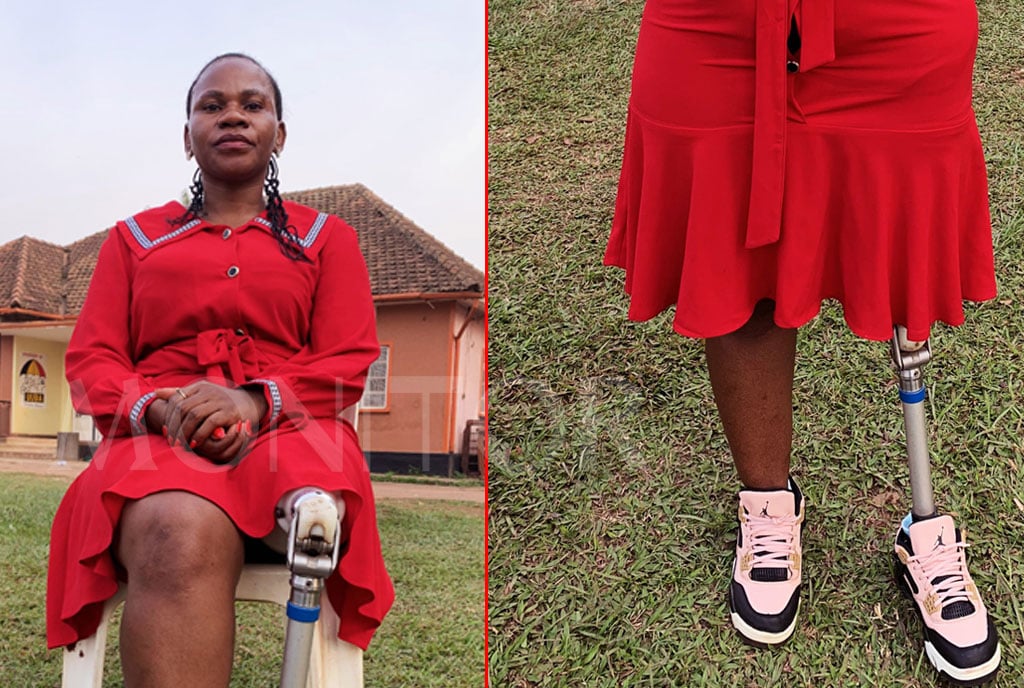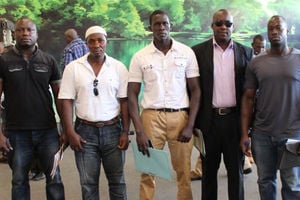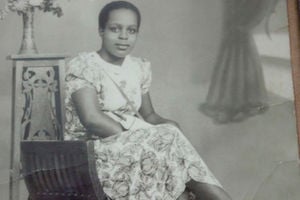
Aisha Senkubuge shows her prosthetic leg. PHOTO/PROMISE TWINAMUKYE
Aisha Nampeera Senkubuge lost her leg while transporting food for herself and some of her colleagues during the Covid-19 lockdown. The tragic accident found her doing what she always aspired to do since she was 16 - being a bouncer.
A second born of four, Senkubuge lost her parents when she was 10 years old. They used to live in Kabulasoke in Gomba District.
With no relatives to take care of them, she quickly assumed the role of ‘guardian’, looking after her siblings in a grass-thatched house their parents had left them.
Two years later, a family friend sent Senkubuge to her friend in Kampala to work as a househelp. She was later passed on to another family.
“The work was too much for a 12-year-old, and there was no pay. I had gone to work to help my siblings back at home, but without pay I felt useless,” Senkubuge says.
She took to the streets to vend food. While there, she made friends. One of Senkubuge’s friends suggested to her that they go to Sudan for greener pastures.
Out-of-country hustle
At 16, Senkubuge left for Sudan, where she worked in a restaurant for more than a year.
“While there, officers, regardless of their rank, acted like they ruled the world. They would come to the restaurant, eat and then leave without paying. No one would dare say anything to them. It worsened when you were non-Sudanese. I cannot forget a scenario where I asked for pay and a man raised his voice, gesturing animatedly at me. He almost slapped me. Most of my peers barely survived slaps because of asking for payment,” she claims.
Senkubuge promised to train and become an escort or guard to make people feel safer.
One of her boss’s landlords, who was an ex-officer trained young people in defence skills. The young woman begged to join the training and her journey to becoming a bouncer began.

Aisha Senkubuge (C) working out in a gym before she lost her leg. PHOTO/HANDOUT
A year later, she borrowed money from her then-boyfriend, topped up her savings and started a restaurant. Business went well and she made enough to save and send home. In 2011, Senkubuge realised she was pregnant and returned home.
It was time for greener pastures again. Leaving her four-months-old child with her siblings and aunt, she went to Dubai. There, she trained for six months and started working in malls as a security guard.
Two years later, she used her savings to buy land and built a two-bedroom house in Busabala, where she left her family to go back to hustle.
“A friend connected me to India, but with no formal qualifications, the only job available was prostitution. I could not take it. I returned to Uganda after three months. I looked for more opportunities until Turkey opened doors,” she says.
Without certification, Senkubuge could not get a security job in Turkey, and thus settled as a casual labourer which came with a paltry pay.
Diamond in the rough
After just two weeks in Turkey, working in a plastics factory, Senkubuge with her newfound Ugandan friends, went to Sweden.
“The journey to Europe was tedious. Just to cross, I had to travel illegally. A boat meant for 10 people smuggled 50 people over to Greece. We paid more than $500 to cross. For fear of deportation, I dropped my passport in the sea,” she recalls.
There was another group of asylum-seeking Syrian immigrants who arrived at the border at the same time as the Senkubuge’s did. They merged. They spent more than a month moving from Greece through Austria, and Germany, from where her money got depleted.
“I slept at a train station for over a week until I got money to continue the journey. I called the father of my child who sent me some money through an acquaintance (I went to a house near the train station and the person allowed me to receive money through her account). The journey continued,” she recalls.
In Denmark
They arrived in Denmark, where they were stopped but got detained in an asylum centre because they had no identification.
While there, she attended different courses including acting, learning English and Danish.
“I grabbed every opportunity since I had enough time on my hands. I even did a fire fighting course, first aid, joined the security training again and acting (I acted in a play at the opera house in Denmark on immigrants),” she says.
After six months, she asked for a transfer that saw her in a camp near the city. This made it easy for her to earn money from different jobs and find like-minded people.
“I earned about Shs50, 000 per hour (illegally) and kept sending it home to care for my son and my siblings’ school fees,” Senkubuge relates.
Five years later, after failing to secure legal residency, she was sent back to Uganda. By the time she returned, she was already in a group of bouncers in Uganda in 2017. She joined physically the moment she returned early 2019 and because of her experience, she advised the leaders to legalise the association.
The young woman was paid $200 per month for six months. Five months later, the Danish government gave her Shs15m for a start-up.
She bought another piece of land in Seguku and relocated the family.
“I would only earn Shs80, 000 guarding at concerts, private parties and certain clubs. I was happy that I was finally doing what I wanted and making a livelihood,” she recounts.
Losing a leg
In the wake of Covid-19, followed by the lockdown, many businesses suffered – and so did Senkubuge’s work. There was little or no need for guards or bouncers anymore since the clubs were closed and so were events.
The Bouncers Association of Uganda sought help from Maj Gen Elly Kayanja. He gave them maize flour and beans, which were transported to their offices.
“We had to devise means to get the food from the office. Since one of the workers lived in Entebbe, I decided to transport his share to my house, from where he could pick it up, saving him a longer journey,” she says.
Fitting a few bags of maize flour and beans on her motorcycle, Senkubuge set off on Entebbe Road.
A truck swerved off its lane crushing one of Senkubuge’s legs leaving her to bleed profusely.

Aisha Senkubuge (C) poses for a photo with her peers before she lost her leg. PHOTO/HANDOUT
A Good Samaritan came to her rescue and took her to the nearest clinic for first aid. She was then referred to Mulago Hospital for amputation of the affected leg.
“I had to bribe my way to get the help I needed,” she recounts.
After spending most of her savings on the operation of her leg and eye, she became broke.
Life after tragedy
“I felt my life come to an end. I always had plan B but in my situation, I did not know how to navigate with my new identity,” she says.
Gen Salim Saleh offered and sent her to Mubende barracks where she got an artificial leg, the one she uses now.
She returned to work after healing and started handling more office work at the association rather than going to the field – the gig she loved.
“I used to be a bouncer and even after losing my leg, I can do my job (with a few limitations). I still go to clients and talk to them about the logistics of the job offered and close deals. I can supervise a job, and where there is a need to run, the person capable will do that,” she says.
She also started a small shop that keeps her busy when she is not working.
“I am a testimony that you can be something from nothing. When I learnt that I am the only one who can pick myself up, it kept pushing me to work harder,” Senkubuge says.
Having a child makes her even want to work more because she does not want him to go through the same life pattern.
“I am always looking for something better. If this one fails, I try another,” she says.
Challenges
When Senkubuge had just started, she would work night shifts, which would prove to be dangerous when returning home. She also says she was undermined as a woman in the bouncer business.
“Every time I told people I was a bouncer, they would call it a bluff. A woman bouncer? They scoffed without knowing my experience and skills,” she says.

Aisha Senkubuge on one of her working days. PHOTO/PROMISE TWINAMUKYE
There were times when someone would pay to do a job and they explain how they wanted it done. As she would be doing the same thing, someone would come and dictate something else, claiming Senkubuge did not know what she was doing because she is a woman, especially where there was miscommunication.
Advice
Endeavour to make money.
“In Uganda, when you do not have money, you do not have health – even when you go to most supposedly-to-be-free government entities.”
Do not be over-dependent. Once you get capital, start something that will give you cash flow. Even when the walk is slow, as long as you keep walking, you will reach your destination.



